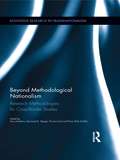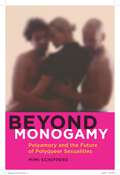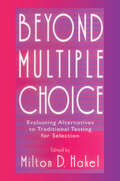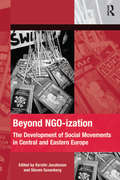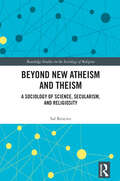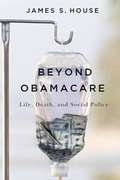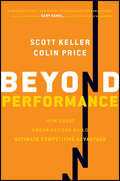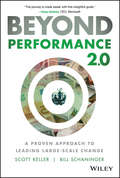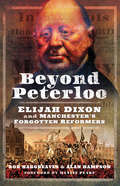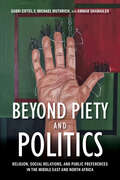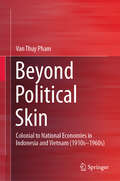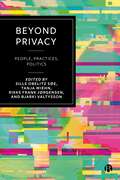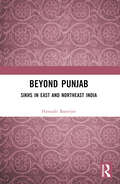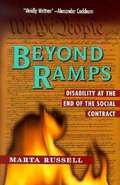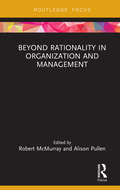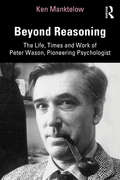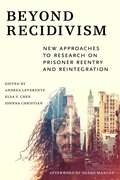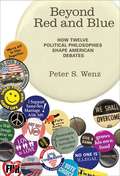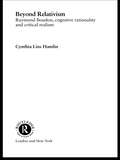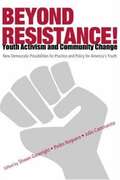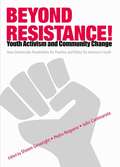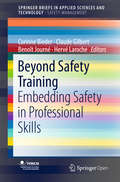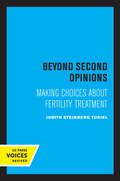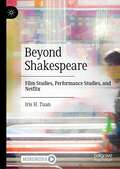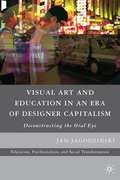- Table View
- List View
Beyond Methodological Nationalism: Research Methodologies for Cross-Border Studies (Routledge Research in Transnationalism)
by Nina Glick Schiller Thomas Faist Anna Amelina Devrimsel D. NergizCross-border studies have become attractive for a number of fields, including international migration, studies of material and cultural globalization, and history. While cross-border studies have expanded, the critique on nation-centered research lens has also grown. This book revisits drawbacks of methodological nationalism in theory and methodological strategies. It summarizes research methodologies of the current studies on transnationalization and globalization, such as multi-scalar and transnational approaches, global and multi-sited ethnography, as well as the entangled history approach and the incorporating comparison approach. This collected volume goes beyond rhetorical criticism on methodological nationalism, which is mainly associated with the ignorance and naturalization of national categories. It proffers insights for the systematic implementation of novel research strategies within empirical studies deployed by young and senior scholars. The novelty lies in an interdisciplinary lens ranging from sociology, social anthropology and history.
Beyond Monogamy: Polyamory and the Future of Polyqueer Sexualities (Intersections #13)
by Mimi SchippersA man and woman are in an open relationship. They have agreed that having sexual partners outside of their relationship is permissible. One night, when her partner is in another city, the woman has sex with the man’s best friend. What does this mean for their relationship? More importantly, why is there such a strong cultural taboo against this kind of triangulation and what does it reveal about the social organization of gender and sexuality? In Beyond Monogamy, Mimi Schippers asks these and other questions to explore compulsory monogamy as a central feature of sexual normalcy. Schippers argues that compulsory monogamy promotes the monogamous couple as the only legitimate, natural, or desirable relationship form in ways that support and legitimize gender, race, and sexual inequalities. Through an investigation of sexual interactions and relationship forms that include more than two people, from polyamory, to threesomes, to the complexity of the ‘down-low,’ Schippers explores the queer, feminist, and anti-racist potential of non-dyadic sex and relationships. A serious look at the intersections of society and sexuality, Beyond Monogamy takes the reader on a compelling and accessible journey through compulsory monogamy, polyamory, and polyqueer sex and relationships.
Beyond Multiple Choice: Evaluating Alternatives To Traditional Testing for Selection
by Milton D. HakelThis volume provides in-depth coverage of a key piece of today's human resource selection technology--the viability of alternatives to paper and pencil multiple-choice selection tests. Each chapter of this edited volume presents an intensive examination of a key "alternative to multiple-choice testing." The content of the book's chapters ranges from reviews of issues associated with, and evidence available for, the use of particular selection text alternatives (computerized testing, performance assessments) to empirical investigation of other alternatives (biodata, creative skills); from examination of standards for choosing among selection tests to practitioners' and test takers' perspectives. This book is important for researchers and practitioners in the human resource selection field who have wanted a resource that provides a comprehensive examination of multiple-choice selection testing and its alternatives.
Beyond NGO-ization: The Development of Social Movements in Central and Eastern Europe (The Mobilization Series on Social Movements, Protest, and Culture)
by Steven Saxonberg Kerstin JacobssonThe celebrations marking the 20th anniversary of the fall of the Berlin Wall provoked a debate on the outcomes of the transition process in the post-communist countries, including a debate on the functioning of civil society. This provided a good opportunity for researchers to collect new data and revise the discourse on collective action and the dynamics of civil society in these countries. Jacobsson and Saxonberg's collection of essays looks at social movements, and their forms of mobilization and organization, as well as action repertoires in relation to the social context, and their success or failure. The book meets an important need in the discourse on post-communist social movements by going beyond the usual discourse about the weak and non-participatory civil society in the post-communist context. This book gives a nuanced and updated view of social movements in post-communist Europe, by looking at the cases of relatively successful mobilization, by examining groups that have often been neglected in the discourse on social movements and civil society (including animal-rights groups, racist movements and non-feminist family organizations), and by giving a deeper analysis of the different strategies that civil society organizations and groups can use. Rather than expecting social movements in post-communist Europe to follow the same patterns and operate in the same fashion as in Western Europe, this volume shows that a wider view of contentious action is needed in order to understand the variety of strategies employed by collective actors operating in this context.
Beyond New Atheism and Theism: A Sociology of Science, Secularism, and Religiosity (Routledge Studies in the Sociology of Religion)
by Sal RestivoThis book addresses the flaws and fallacies in the grounds for atheism and theism – flaws and fallacies that contaminate the arguments of non-believers and believers alike. Focusing on the highly visible debates between the New Atheists – such as Christopher Hitchens, Daniel Dennett, Richard Dawkins, and Sam Harris on the one hand – and their main theist opponents – including Frank Turek, John Lennox, and William Lane Craig on the other – it approaches these debates from the perspective of the sociology of religion and science. With entire worldviews at stake, it explores various failings in the logic, language, and knowledge of the protagonists, revealing mistaken and oversimplified understandings of both science itself and the sociocultural and symbolic roles of religion on both sides. Advancing a secular and humanist worldview unburdened by the problems that beset both atheism and theism, the author argues for a sociological perspective on religion, God, and science as a practice, together with a critical realist approach to the nature of the real world as we experience it. Beyond New Atheism and Theism will therefore appeal to scholars and students of sociology and cultural studies with interests in the conflicting worldviews of science and religion.
Beyond Obamacare: Life, Death, and Social Policy
by James S. HouseHealth care spending in the United States today is approaching 20 percent of GDP, yet levels of U.S. population health have been declining for decades relative to other wealthy and even some developing nations. How is it possible that the United States, which spends more than any other nation on health care and insurance, now has a population markedly less healthy than those of many other nations? Sociologist and public health expert James S. House analyzes this paradoxical crisis, offering surprising new explanations for how and why the United States has fallen into this trap. In Beyond Obamacare, House shows that health care reforms, including the Affordable Care Act, cannot resolve this crisis because they do not focus on the underlying causes for the nation’s poor health outcomes, which are largely social, economic, environmental, psychological, and behavioral. House demonstrates that the problems of our broken health care and insurance system are interconnected with our large and growing social disparities in education, income, and other conditions of life and work, and calls for a complete reorientation of how we think about health. He concludes that we need to move away from our misguided and almost exclusive focus on biomedical determinants of health, and to place more emphasis on addressing social, economic, and other inequalities. House’s review of the evidence suggests that the landmark Affordable Care Act of 2010, and even universal access to health care, are likely to yield only marginal improvements in population health or in reducing health care expenditures. In order to rein in spending and improve population health, we need to refocus health policy from the supply side—which makes more and presumably better health care available to more citizens—to the demand side—which would improve population health though means other than health care and insurance, thereby reducing need and spending for health care. House shows how policies that provide expanded educational opportunities, more and better jobs and income, reduced racial-ethnic discrimination and segregation, and improved neighborhood quality enhance population health and quality of life as well as help curb health spending. He recommends redirecting funds from inefficient supply-side health care measures toward broader social initiatives focused on education, income support, civil rights, housing and neighborhoods, and other reforms, which can be paid for from savings in expenditures for health care and insurance. A provocative reconceptualization of health in America, Beyond Obamacare looks past partisan debates to show how cost-efficient and effective health policies begin with more comprehensive social policy reforms.
Beyond Performance
by Scott Keller Colin PriceThe secret of achieving and sustaining organizational excellence revealedIn an ever-changing world where only a third of excellent organizations stay that way over the long term, and where even fewer are able to implement successful change programs, leaders are in need of big ideas and new tools to thrive. In Beyond Performance, McKinsey & Company's Scott Keller and Colin Price give you everything you need to build an organization that can execute in the short run and has the vitality to prosper over the long term. Drawing on the most exhaustive research effort of its kind on organizational effectiveness and change management, Keller and Price put hard science behind their big idea: that the health of an organization is equally as important as its performance. In the book's foreword, management guru Gary Hamel refers to this notion as "a new manifesto for thinking about organizations."The authors illustrate why copying management best practices from other companies is more dangerous than helpfulClearly explains how to determine the mutually reinforcing combination of management practices that best fits your organization's contextProvides practical tools to achieve superior levels of performance and health through a staged change process: aspire, assess, architect, act, and advance. Among these are new techniques for dealing with those aspects of human behavior that are seemingly irrational (and therefore confound even the smartest leaders), yet entirely predictableUltimately, building a healthy organization is an intangible asset that competitors copy at their peril and that enables you to skillfully adapt to and shape your environment faster than others--giving you the ultimate competitive advantage.
Beyond Performance 2.0: A Proven Approach to Leading Large-Scale Change
by Scott Keller Bill SchaningerLeaders aren’t short on access to change management advice, but the jury has long been out as to which approach is the best one to follow. With the publication of Beyond Performance 2.0, the verdict is well and truly in. By applying the approach detailed by authors, Scott Keller and Bill Schaninger, the evidence shows that leaders can more than double their odds of success—from thirty percent to almost eighty. <p><p> Whereas the first edition of Beyond Performance introduced the authors’ “Five Frames of Performance and Health” approach to change management, the fully revised and updated Beyond Performance 2.0 has been transformed into a truly practical “how to” guide for leaders. Every aspect of how to lead change at scale is covered in a step-by-step manner, always accompanied by practical tools and real-life examples. <p> Keller and Schaninger’s work is distinguished in many ways, one of which is the rigor behind the recommendations. The underpinning research is the most comprehensive of its kind—based on over 5 million data points drawn from 2,000 companies globally over a 15-year period. This data is overlaid with the authors’ combined more than 40 years of experience in helping companies successfully achieve large-scale change. As senior partners in McKinsey & Company, consistently named the world’s most prestigious management consulting firm, Keller and Schaninger also draw on the shared experience of their colleagues from offices in over 60 countries with unrivaled access to CEOs and senior teams. <p> Beyond Performance 2.0 also dares to go against the grain—eschewing the notion of copying best practices and instead guiding leaders to make choices specific to their unique context and organization. It does this with meticulously balance of focus on short- and long-term considerations, and on fully addressing the hard technical and oft cultural elements of making change happen. Further, the approach doesn’t just focus on delivering change; it builds an organization’s muscle to continuously change, making it healthier so that it can act with increased speed and agility to stay perpetually ahead of its competition. <p> Leaders looking for a proven approach to leading large-scale change from a trusted source have found what they are looking for in Beyond Performance 2.0.
Beyond Peterloo: Elijah Dixon and Manchester's Forgotten Reformers
by Maxine Peake Rob HargreavesELIJAH DIXON played a key role in the Blanketeer's March of 1817. Arrested, chained in double irons and imprisoned without trial, the episode set the stage for the Peterloo Massacre.Everybody in Victorian Manchester knew of Elijah Dixon. Over a period of sixty years, he was an ever-present force in the tumultuous politics of the town. He worked alongside the great figures of nineteenth century Radicalism, and as 'The Manchester Man' he became the towns ambassador for Chartism. An early apostle of votes for women, Temperance advocate, Christian convert, Dixon rose from poverty to make a fortune as Britains first mass-producer of matches.In Beyond Peterloo, Robert Hargreaves and Alan Hampson bring Elijahs previously overlooked yet vital contribution to social reform to life. Set against the backdrop of the Blanketeers March of 1817 and the Peterloo Massacre of 1819, they reveal the fascinating story of his life and work as Manchesters forgotten reformer.
Beyond Piety and Politics: Religion, Social Relations, and Public Preferences in the Middle East and North Africa
by Ammar Shamaileh Sabri Ciftci F. Michael WuthrichHow do ordinary men and women in Muslim-majority societies create religion-informed views of political topics such as democracy and economics?Beyond Piety and Politics provides a groundbreaking approach to understanding the depth and variety of political attitudes held by people who consider themselves to be pious Muslims. Using survey data on religious preferences and behavior, the authors argue for the relevance and importance of four outlook categories—religious individualist, social communitarian, religious communitarian, and post-Islamist—and use these to explore complex and nuanced attitudes of devout Muslims toward issues like democracy and economic distribution. They also reveal how intrafaith variation in political attitudes is not due simply to doctrinal differences but is also a product of the social aspects of religious association operating within political contexts.By highlighting the dynamic societal and political implications of religious devotion, Beyond Piety and Politics offers a fascinating new theoretical perspective on Islam and politics.
Beyond Political Skin: Colonial to National Economies in Indonesia and Vietnam (1910s-1960s)
by Phạm Văn ThuỷThis book explains the dynamics behind the economic transformation from the colonial era to the post-independence period in Indonesia and Vietnam. It analyses the different Vietnamese and Indonesian government approaches to the economic legacies of colonialism remaining in these countries after independence. It also demonstrates that despite critical differences between the two nation-states, the Vietnamese and Indonesian leaderships were pursuing similar long-term goals: to create a truly independent national economy. The book discusses the way in which the Indonesian government established complete economic control, resembling the socialist transformation of North Vietnam in the 1950s, and the various means by which the government of South Vietnam concentrated economic power in its own hands during the late 1950s and early 1960s. It also explores how the Indonesian government was determined remove the economic legacy of Dutch colonialism by placing the entire economy under strong state control and ownership in accordance with the spirit of Guided Democracy and Guided Economy in the late 1950s and the early 1960s. This book is a point of reference for students, researchers and academics interested in a comparative analysis of the economic systems implemented by the colonial and fascist powers in Indonesia and Vietnam.
Beyond Privacy: People, Practices, Politics
by Sille Obelitz Søe, Tanja Wiehn, Rikke Frank Jørgensen, and Bjarki ValtyssonDiscussions around digital technologies, new media, platforms and information have long centred on the protection of personal data and privacy. This timely volume extends the conversation to address fundamental societal and structural issues from three perspectives: people, practices and politics. Organised around an international collection of case studies, the book provides a valuable contribution to our understanding of the challenges of privacy in the digital sphere, from emerging regulatory programmes to surveillance capitalism and big tech companies. Taking a multidisciplinary approach, this is a new and innovative perspective on our datafied societies that goes beyond privacy. It will be a key resource for scholars and students of communication and media studies, and science and technology studies.
Beyond Punjab: Sikhs in East and Northeast India
by Himadri BanerjeeThis book focuses on Sikh communities in east and northeast India. It studies settlements in Bihar, Odisha, West Bengal, Assam, Meghalaya, and Manipur to understand the Indian Sikhs through the lens of their dispersal to the plains and hills far from Punjab. Drawing on robust historical and ethnographic sources such as official documents, media accounts, memoirs, and reports produced by local Sikh institutions, the author studies the social composition of the immigrants and surveys the extent of their success in retaining their community identity and recreating their memories of home at their new locations. He uses a nuanced notion of the internal diaspora to look at the complex relationships between home, host, and community. As an important addition to the study of Sikhism, this book fills a significant gap and widens the frontiers of Sikh studies. It will be indispensable for students and researchers of sociology and social anthropology, history, migration and diaspora studies, religion, especially Sikh studies, cultural studies, as well as the Sikh diaspora worldwide.
Beyond Ramps: Disability at the End of the Social Contract
by Marta RussellThe Social Contract -- Rousseau's famous term concerning the bond between a government and its people -- has been sold to the highest bidder. Freedom is reserved only for markets in a society increasingly strangled by corporate power. "Empowerment" is the new definition of destitution. By looking at the struggles of the disabled faced with the end of social services, Ending the Social Contract as We Know It provides a powerful warning: the disabled are as canaries in a coal mine, and their maltreatment is a harbinger of things to come for the rest of us. In a tightly woven argument, Marta Russell shows how the onslaught of corporate power facing the disabled -- from issues like genetic screening, to restricted access to health care, to welfare reform -- will shortly be faced by a much broader segment of society.
Beyond Rationality in Organization and Management (Routledge Focus on Women Writers in Organization Studies)
by Alison Pullen Robert McMurraySpanning the 20th and 21st centuries, the writers considered in this first book of the Routledge Focus on Women Writers in Organization Studies series make an important contribution to how we think about rationality in managing, leading and working. It provides a space in which to think differently about rationality, challenging dominant masculine logics while positioning relations between people centre stage. A critical and intellectually provocative text, the book provides a nuanced and practical account of rationality in organizational contexts, making it clear that women have and continue to write groundbreaking work on the subject: women like Lillian Moller Gilbreth, who was at the forefront of developments in scientific management, and Frances Perkins, who was the first female US cabinet secretary. Both are important not only for what they achieved but also as illustrations of the ways in which women have been written out of the accounts of managing and management thought. This matters not only because credit is denied to those who deserve it, but also because it impoverishes our understanding of complex organisational phenomenon. Where so much extant writing on managing and organizing is preoccupied with abstract notions of structure, strategy, metaphor and machines, the writers considered here explain why effective working and managing is primarily about seeing and working with people. Writers such as Arlie Hochschild, Mary Parker Follett and Heather Höpfl remind us that rationality cannot be decoupled from emotion or, where a system is to be rationalised, then it should start with and enhance the lives of people – be designed with people at the centre. In this sense, the book is not arguing for a wholesale rejection of rationality. Rather, authors call on readers to move beyond a preoccupation with rationality for its own sake, seeing it instead as a useful and highly contestable aspect of organizational life. Each woman writer is introduced and analysed by an expert in their field. Further reading and accessible resources are also identified for those interested in knowing more. This book will be relevant to students, researchers and practitioners with an interest in business and management, organizational studies, critical management studies, gender studies and sociology. Like all the books in this series, it will also be of interest to anyone who wants to see, think and act differently.
Beyond Reasoning: The Life, Times and Work of Peter Wason, Pioneering Psychologist
by Ken ManktelowThis book tells the story of Peter Cathcart Wason, offering unique insights into the life of the pioneering research psychologist credited for establishing a whole new field of science: the psychological study of reasoning. And this was just one of the major contributions he made to psychology. Covering much more than Wason’s academic work, the author, Ken Manktelow, paints a vivid and personal portrait of the man. The book traces Wason’s eclectic family history, steeped in Liberal politics and aristocratic antecedents, before moving through his service in the Second World War and the life-changing injuries he sustained at the end of it, and on to his abortive first attempt at a career and subsequent extraordinary success as a psychologist. Following a chronological structure with each chapter dedicated to a significant transition period in Wason’s life, Manktelow expertly weaves together personal narratives with Wason’s evolving intellectual interests and major scientific discoveries, and in doing so simultaneously traces the worlds that vanished during the twentieth century. A brilliant biography of one of the most renowned figures in cognitive psychology, this book will be of interest not only to students and scholars in thinking and reasoning, but to anyone interested in the life and lasting contribution of this celebrated scholar.
Beyond Recidivism: New Approaches to Research on Prisoner Reentry and Reintegration
by Andrea Leverentz, Elsa Y. Chen, and Johnna ChristianUnderstanding reentry experiences after incarcerationPrison in the United States often has a revolving door, with droves of formerly incarcerated people ultimately finding themselves behind bars again. In Beyond Recidivism, Andrea Leverentz, Elsa Y. Chen, and Johnna Christian bring together a leading group of interdisciplinary scholars to examine this phenomenon using several approaches to research on recently released prisoners returning to their lives. They focus on the social context of reentry and look at the stories returning prisoners tell, including such key issues as when they choose to reveal (or not) their criminal histories. Drawing on contemporary studies, contributors examine the best ideas that have emerged over the last decade to understanding the challenges prisoners face upon reentering society. Together, they present a complete picture of prisoner reentry, including real-world recommendations for policies to ensure the well-being of returning prisoners, regardless of their past mistakes.
Beyond Red and Blue: How Twelve Political Philosophies Shape American Debates
by Peter S. WenzOn any given night cable TV news will tell us how polarized American politics is: Republicans are from Mars, Democrats are from Canada. But in fact, writes Peter Wenz in Beyond Red and Blue,Americans do not divide neatly into two ideological camps of red/blue, Republican/Democrat, right/left. If they did, what could explain Republicans who oppose the Patriot Act and support gay marriage, or liberals and conservatives who agree over genetic engineering? In real life, as Wenz shows, different ideologies can converge on certain issues; people from the right and left can support the same policy for different reasons. Thus, for example, libertarian-leaning Republicans can oppose the Patriot Act's encroachment on personal freedom and social conservatives can support gay marriage on the grounds that it strengthens the institution of marriage; liberals might oppose genetic engineering on environmental grounds, conservatives on religious grounds. Wenz maps out twelve political philosophies--ranging from theocracy and free-market conservatism to feminism and cosmopolitanism--on which Americans draw when taking political positions. He then turns his focus to some of America's most controversial issues and, through in-depth discussions of fourteen of them, shows how ideologically diverse coalitions can emerge. These hot-button issues include extending life by artificial means (as in the Terry Schiavo case); the war on drugs; the war on terrorism; affirmative action; abortion; same-sex marriage; healthcare; immigration; and globalization. Awareness of these twelve political philosophies, Wenz argues, can help activists enlist allies, citizens better understand politics and elections, and all of us define our own political identities.
Beyond Relativism: Raymond Boudon, Cognitive Rationality and Critical Realism (Routledge Studies in Critical Realism #Vol. 2)
by Cynthia Lins HamlinThis book argues that critical realism offers the theory of cognitive rationality a real way of overcoming the limitations of methodological individualism by recognising both the agents' - and the social structure's - causal powers and liabilities. Cynthia Lins Hamlin persuasively argues that critical realism represents a better safeguard against the relativism which springs from the conflation of social reality and our ideas about it. This is an important book for sociologists and anyone working in the social sciences, and for all those concerned with the methodology, and philosophy, of social science.
Beyond Resistance! Youth Activism and Community Change
by Shawn Ginwright Julio Cammarota Pedro NogueraOver the past decade, urban communities have experienced unprecedented social, economic, and political transformation. Globalization and de-industrialization have contributed to the exodus of jobs, produced higher levels of inequality, and consequent, furthered marginalization of the urban poor. Urban youth have been particularly affected by this transformation. The failure of urban school districts and the lack of jobs, health services and effective prevention and intervention programs have placed large numbers of low-income urban youth at risk. In the absence of policies and institutions that respond to the needs of youth, a climate of fear focused particularly on responding to fears of youth crime has also shaped a national consciousness about urban communities and the youth within them. Urban Youth and CommunityChangebrings together work by leading scholars who study urban youth and who have a grounded knowledge of the issues they face. A commitment to social justice and equity is aunifying theme for this volume, and each of the authors examines to varying degrees how such values and commitments can be incorporated into public policy. The goal of this edited volume is to draw on the knowledge and expertise of these scholars from various academic disciplines and to share with policymakers and the general public insights into the impact of punitive/zero tolerance policies on young people's educational experience and well being. These chapters also offer new ideas about how to support youth placed at risk by deteriorating circumstances in urban areas and offers recommendations on how to create more humane and responsive youth policies at the local, state and federal level.
Beyond Resistance! Youth Activism and Community Change: New Democratic Possibilities for Practice and Policy for America's Youth (Critical Youth Studies)
by Shawn Ginwright Pedro Noguera Julio CammarotaThe failure of current policy to address important quality of life issues for urban youth remains a substantial barrier to civic participation, educational equity, and healthy adulthood. This volume brings together the work of leading urban youth scholars to highlight the detrimental impact of zero tolerance policies on young people’s educational experience and well being. Inspired by the conviction that urban youth have the right to more equitable educational and social resources and political representation, Beyond Resistance! offers new insights into how to increase the effectiveness of youth development and education programs, and how to create responsive youth policies at the local, state, and federal level.
Beyond Safety Training: Embedding Safety in Professional Skills (SpringerBriefs in Applied Sciences and Technology)
by Corinne Bieder Claude Gilbert Benoît Journé Hervé LarocheThis book is open access under a CC BY 4. 0 license. This book investigates why, despite more and more resources devoted to safety training, expectations are not entirely met, particularly in the industrial sectors that have already achieved a high safety level. It not only reflects the most precious viewpoints of experts from different disciplines, different countries, with experiences in various industrial fields at the cutting edge of theories and practices in terms of safety, professionalization and their relationships. It also consolidates the positioning of the Foundation for an Industrial Safety Culture, highlighting what is currently considered at stake in terms of safety training, taking into account the system of constraints the different stakeholders are submitted to. It reports some success stories as well as elements which could explain the observed plateau in terms of outcome. It identifies some levers for evolution for at-risk industry and outlines a possible research agenda to go further with experimental solutions.
Beyond Second Opinions: Making Choices about Fertility Treatment
by Judith Steinberg TurielBeyond Second Opinions is both an exposé of the risks, errors, and distortions surrounding fertility medicine and an authoritative guide for people seeking treatment. Accessible, comprehensive, and extremely well-informed, this book takes the reader beyond hype to the hard data on diagnoses and treatments. Judith Steinberg Turiel, a consumer health activist and herself a veteran of fertility treatments, uses the most up-to-date medical literature to shed new light on difficult decisions patients face today and on reproductive questions society must begin to address now. Those who are seeking a more balanced perspective to help them make better, more informed decisions will find a wealth of information about current reproductive interventions—from simple fertility pills to dazzling experimental options—as well as a discussion of the non-medical forces (economic and political) that shape an individual's treatment choices and reproductive outcomes. Despite quantities of information showered upon patients, they remain woefully misinformed; some fertility treatments may actually reduce chances for a successful pregnancy and threaten a patient's health. Turiel looks beyond surface claims to the real information, often uncovering counterintuitive findings and sometimes scandalous revelations. She exposes a realm of unregulated expansion, unscientific experimentation, and recent scandal over stolen embryos. Weaving together first-hand accounts, compelling stories, a range of scientific information, and lively anecdotes, Turiel addresses the persistent gulfs that separate medical professionals and health care consumers. In the process she arms laypeople with what they might not learn about infertility practices from doctors, patient education brochures, and the newspaper. This title is part of UC Press's Voices Revived program, which commemorates University of California Press’s mission to seek out and cultivate the brightest minds and give them voice, reach, and impact. Drawing on a backlist dating to 1893, Voices Revived makes high-quality, peer-reviewed scholarship accessible once again using print-on-demand technology. This title was originally published in 1998.
Beyond Shakespeare: Film Studies, Performance Studies, and Netflix
by Iris H. TuanWith joy and grace to accompany the readers to have the translocal tour to visit about thirty-seven works, this monograph applies the academic critical theories of Performance Studies, Film Studies, Psychoanalysis, Postmodernism, and Visual Culture, to interpreting the special selection works. The focus and common theme are on race, body, and class. With the background of COVID-19 since 2019 up to the present, the book offers the readers with the remarkable insight of human beings’ accumulated wisdom and experiences in surviving with the dreadful diseases like the plagues in Shakespeare’s time. After the supreme reading, may the global readers in the world acquire the knowledge and power to live in sustainability with education and entertainment of films, performances, and online streaming Netflix TV dramas.
Beyond Slavery
by Jan JagodzinskiThis book offers a unique perspective of art and its education in designer capitalism. It will contribute to the debate as to possibilities art and design hold for the future. It also questions the broad technologization of art that is taking place.
